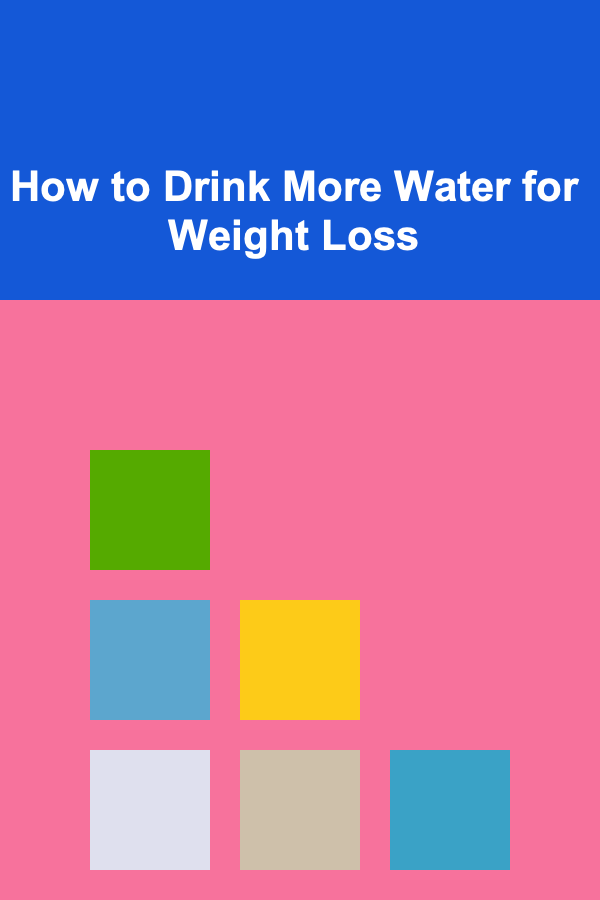
How to Drink More Water for Weight Loss
ebook include PDF & Audio bundle (Micro Guide)
$12.99$6.99
Limited Time Offer! Order within the next:

Water is often overlooked in the world of weight loss, with many people focusing on diet trends, exercise routines, or supplements. However, drinking water has been proven to be one of the most effective and natural strategies to aid in weight loss. In this article, we'll explore how drinking more water can help you lose weight, why it's essential for your health, and practical tips on how to drink more water daily to achieve your weight loss goals.
The Science Behind Water and Weight Loss
1. Water Suppresses Appetite
One of the primary ways that water supports weight loss is by suppressing appetite. Drinking water before meals can help make you feel fuller, leading to reduced calorie consumption. This is particularly useful when you're trying to control portion sizes and avoid overeating.
Research has shown that people who drink water before meals tend to eat fewer calories. For instance, a study published in the journal Obesity found that individuals who drank about 500 mL (17 ounces) of water 30 minutes before meals consumed fewer calories and lost more weight than those who did not drink water before eating.
2. Water Increases Metabolism
Water also plays a key role in boosting your metabolism. Your metabolism is the process by which your body converts food and drink into energy. Studies have shown that drinking water can increase the rate at which your body burns calories.
A study published in The Journal of Clinical Endocrinology and Metabolism found that drinking 500 mL of water increased metabolic rate by 30% for 30 to 40 minutes. The increase in metabolism was significant enough to help burn more calories throughout the day. This means that drinking water could help you burn more calories even while at rest.
3. Water Flushes Out Toxins
Drinking adequate amounts of water helps your body remove waste products and toxins. When you stay hydrated, your kidneys function properly, and waste is efficiently eliminated through urine. This detoxification process can lead to a feeling of lightness and overall improved health, which supports your weight loss journey.
Additionally, when your body is dehydrated, it may struggle to get rid of toxins, which can lead to bloating and discomfort. By drinking water consistently, you can help prevent these issues and support your body's natural detoxification processes.
4. Water Helps with Digestion
Proper hydration is essential for optimal digestion. Water helps break down food and ensures that nutrients are absorbed efficiently. Dehydration can slow down digestion, leading to constipation and bloating. When you're dehydrated, your body may also retain water, leading to temporary weight gain due to fluid retention.
Drinking enough water ensures smooth digestion and helps avoid digestive discomfort, bloating, and constipation. A properly functioning digestive system is essential for healthy weight management, as it helps prevent overeating and encourages the body to efficiently process food.
How to Drink More Water: Tips and Strategies
1. Start Your Day with Water
A great way to ensure you're drinking more water is to start your day with a glass of water. After waking up, your body is often dehydrated, having gone several hours without any fluids. Drinking water first thing in the morning not only rehydrates you but also helps kickstart your metabolism for the day.
You can add a slice of lemon to your water for a refreshing start and to support digestion. Drinking water early in the morning can also help reduce the feeling of hunger, making it easier to stick to a healthy eating plan throughout the day.
2. Carry a Water Bottle
One of the simplest ways to drink more water is to keep a water bottle with you at all times. Having water readily available encourages you to drink it more frequently. A reusable water bottle is an eco-friendly and practical solution for staying hydrated on the go.
Try to get into the habit of sipping water throughout the day rather than waiting until you're thirsty. Thirst is often a sign that you're already dehydrated, so it's best to prevent dehydration by drinking water regularly.
3. Set Reminders
In our busy lives, it's easy to forget to drink water. Setting reminders on your phone or using a hydration tracking app can help you stay on top of your water intake. You can set a reminder to drink water every hour or before every meal to ensure you're staying hydrated consistently.
Another effective strategy is to associate drinking water with other daily activities. For example, drink a glass of water every time you finish a task or before you sit down to work or study. This creates a habit that integrates drinking water into your routine.
4. Drink Water Before Meals
As mentioned earlier, drinking water before meals can help control your appetite and reduce calorie consumption. Make it a habit to drink a glass of water about 30 minutes before each meal. This will not only help you stay hydrated but also create a feeling of fullness, which may prevent overeating and lead to weight loss over time.
If you're struggling with cravings or hunger between meals, drinking water can also help curb those feelings. Sometimes, the body confuses thirst with hunger, so drinking water may help alleviate unnecessary snacking.
5. Use Flavor Enhancers
If you're not a fan of plain water, there are many ways to add flavor without adding sugar or calories. You can infuse your water with fruits, herbs, and vegetables. Some popular water infusions include lemon, cucumber, mint, and berries. These natural additions make your water more enjoyable to drink while still providing the benefits of hydration.
Herbal teas are another excellent option. Unsweetened herbal teas, such as green tea or chamomile, can also contribute to your daily water intake while offering additional health benefits, such as boosting metabolism or promoting relaxation.
6. Track Your Water Intake
Tracking your water intake is a powerful way to stay accountable and ensure you're drinking enough throughout the day. Many apps are designed to help you log your water consumption, and some even send reminders to encourage you to keep drinking. If you prefer a low-tech option, simply mark off each glass of water you drink on a notepad or a water intake chart.
Setting a specific water goal for the day, such as 8 cups or 2 liters, can help you stay focused on achieving your hydration goals. You can also adjust the amount of water you need based on your activity level, climate, and other factors that affect hydration.
7. Drink Water with Meals and Snacks
Make drinking water a part of your eating routine by having a glass of water with every meal and snack. This will help you stay on track with your hydration goals and also prevent overeating. Drinking water with meals can improve digestion and help you feel satisfied with a smaller portion size.
When snacking, it's easy to mindlessly consume high-calorie, sugary foods. By drinking water with your snacks, you can reduce cravings and prevent overconsumption of unhealthy snacks.
8. Eat Water-Rich Foods
Incorporating water-rich foods into your diet can also help you stay hydrated. Many fruits and vegetables have a high water content, which can contribute to your overall fluid intake. Some examples of hydrating foods include watermelon, cucumber, oranges, strawberries, and celery.
These foods are not only hydrating but also provide essential vitamins, minerals, and fiber. By eating more water-rich foods, you can increase your hydration without relying solely on drinks.
9. Gradually Increase Water Intake
If you're not used to drinking a lot of water, it can be overwhelming to suddenly try to increase your intake. Instead of drastically changing your habits, try to gradually increase your water consumption over time. Start by adding one extra glass of water to your daily routine and then build from there.
By taking small steps, you can create a sustainable habit that becomes second nature. Consistency is key when it comes to hydration, so focus on making water a regular part of your day rather than forcing yourself to drink large quantities all at once.
10. Listen to Your Body
Your body will often give you signs when you need more water. Common signs of dehydration include dry mouth, fatigue, headaches, and dark-colored urine. Pay attention to these signals and make sure you're drinking enough water to keep your body functioning at its best.
If you're engaging in physical activity, especially in hot weather, you'll need to drink more water to compensate for the fluid lost through sweat. Drinking water during and after exercise is crucial to rehydrate your body and prevent dehydration.
Conclusion
Drinking more water is a simple yet powerful strategy for weight loss. It helps control your appetite, boosts your metabolism, supports digestion, and aids in the removal of toxins. By following the practical tips outlined above, you can make water a consistent part of your daily routine and harness its full potential for weight loss.
Remember, the key is consistency. Start small, track your intake, and gradually increase your water consumption over time. With dedication and commitment, you'll not only stay hydrated but also improve your health and support your weight loss goals. So grab a glass of water, drink up, and start your journey toward a healthier, slimmer you.

How to Design a Functional Laundry Area
Read More
How to Let ChatGPT Help You Learn Chemistry
Read More
How to Maintain a Clean and Tidy Hobby Area
Read More
How to Make Your Home More Secure with Smart Home Technology
Read More
How to Plan the Ultimate Movie Night Party at Home
Read More
10 Tips for Supporting a Loved One Facing Genetic Counseling
Read MoreOther Products

How to Design a Functional Laundry Area
Read More
How to Let ChatGPT Help You Learn Chemistry
Read More
How to Maintain a Clean and Tidy Hobby Area
Read More
How to Make Your Home More Secure with Smart Home Technology
Read More
How to Plan the Ultimate Movie Night Party at Home
Read More